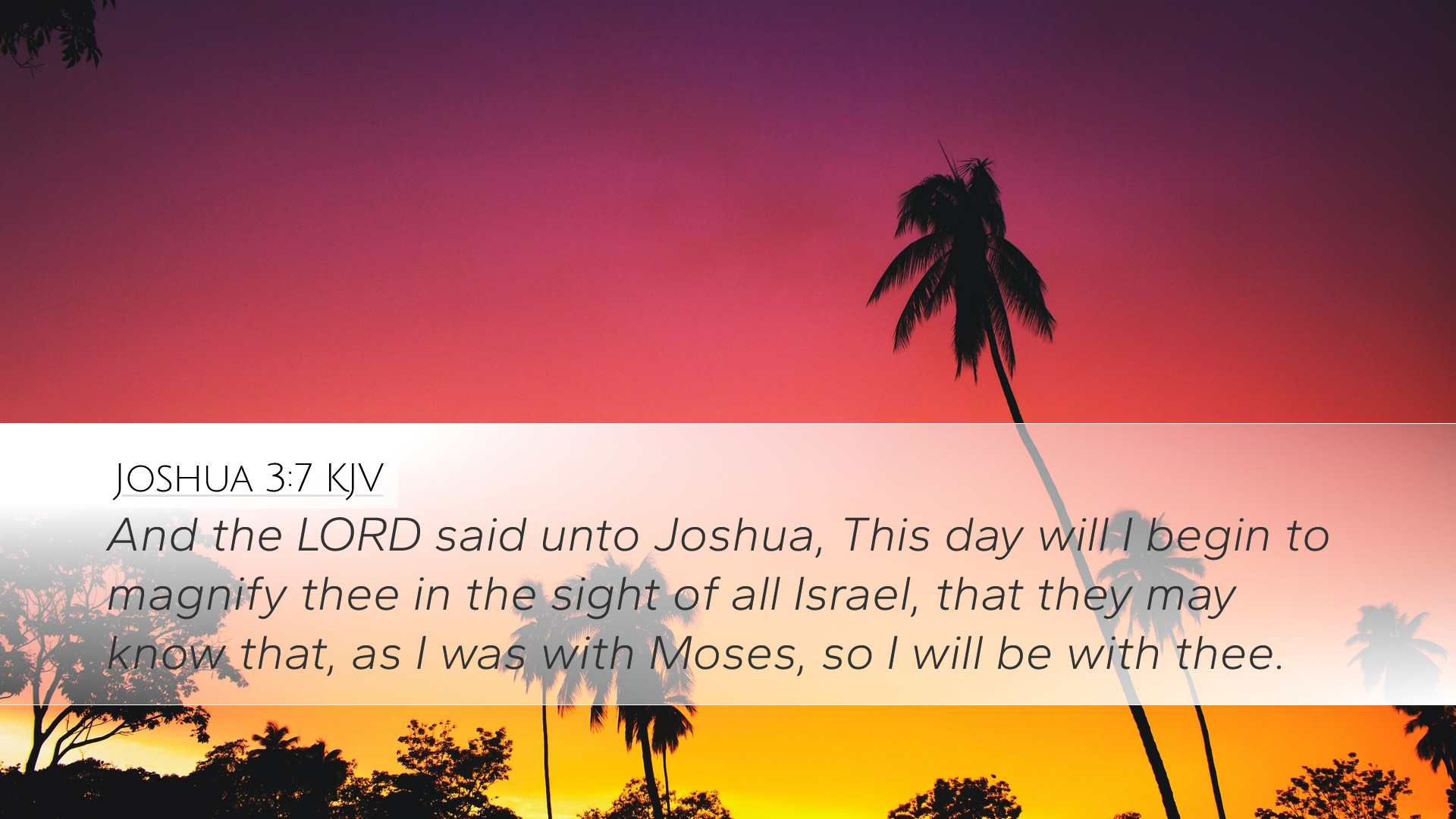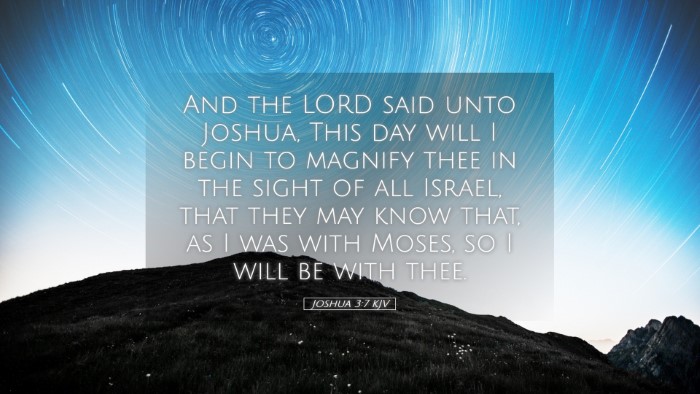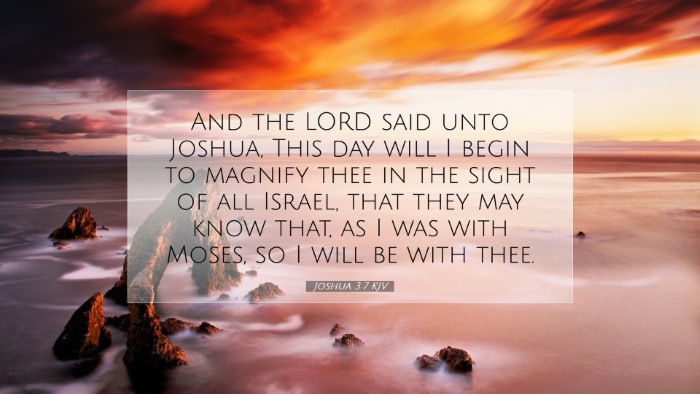Old Testament
Genesis Exodus Leviticus Numbers Deuteronomy Joshua Judges Ruth 1 Samuel 2 Samuel 1 Kings 2 Kings 1 Chronicles 2 Chronicles Ezra Nehemiah Esther Job Psalms Proverbs Ecclesiastes Song of Solomon Isaiah Jeremiah Lamentations Ezekiel Daniel Hosea Joel Amos Obadiah Jonah Micah Nahum Habakkuk Zephaniah Haggai Zechariah MalachiJoshua 3:7
Joshua 3:7 KJV
And the LORD said unto Joshua, This day will I begin to magnify thee in the sight of all Israel, that they may know that, as I was with Moses, so I will be with thee.
Joshua 3:7 Bible Commentary
Commentary on Joshua 3:7
Verse: "And the LORD said unto Joshua, This day will I begin to magnify thee in the sight of all Israel; that they may know that, as I was with Moses, so I will be with thee."
Introduction
This verse marks a pivotal moment in the leadership transition from Moses to Joshua, demonstrating God’s assurance and the beginning of a transformative journey for Israel. Here, we will explore the depths of this scripture through the combined insights of esteemed public domain commentaries by Matthew Henry, Albert Barnes, and Adam Clarke.
The Assurance of God
God's Promise
In this passage, we see God reaffirming His promise to Joshua. As noted by Matthew Henry, the phrase "This day will I begin to magnify thee" suggests that this is not just a single event, but a process of recognition and validation in the sight of the people. God initiates Joshua’s exaltation among the Israelites, paralleling the honor bestowed upon Moses, hence reinforcing Joshua's leadership. The assurance that God was with Moses serves to comfort Joshua, reminding him of God's continuing presence.
Understanding Magnification
The Meaning of Magnification
Albert Barnes highlights that to magnify someone implies not only honor but also an elevation of their status in the eyes of others. The context here emphasizes God’s intention to affirm Joshua’s role as a leader. This moment can be seen as a divine endorsement of Joshua, which would instill trust and faith among the Israelites. God magnifying Joshua is intrinsically linked to the purpose of demonstrating His power and sovereignty through the leader He has chosen.
Leadership and Responsibility
The Weight of Leadership
God’s declaration comes with an acknowledgment of the immense responsibility and challenges that Joshua would face. According to Adam Clarke, this moment illustrates the importance of divine endorsement in leadership. Joshua would need to carry out God’s commands, and it was crucial that the people recognize his authority as rooted in God's intention. Thus, we gain insight into the relational dynamic in leadership, where God actively supports His leaders while also holding them accountable.
Historical Context
Transition of Leadership
This verse falls at a significant moment in Israel's history as they prepare to enter the Promised Land. Understanding the context preceding this scripture allows us to appreciate the burdens Joshua bears. Coming after the death of Moses, the Israelites would naturally look for signs of legitimacy in their new leader. As noted by both Barnes and Henry, God’s promise to Joshua not only emboldens him but also assures the people that the same God who led them through Moses will continue to guide them.
Encouragement to the People
Building Trust Among the Israelites
In proclaiming His presence with Joshua, God aimed to foster unity among the Israelites. The people needed reassurance that their new leader had God’s backing, especially as they faced the daunting task of conquering their new homeland. Barnes sheds light on the necessity of this divine validation during critical leadership transitions. Such transitions often create unease, and God’s statement serves to quell any potential discord and establish a foundation of faith in Joshua’s leadership.
Comparison with Moses
Continuity of God's Presence
The mention of Moses serves to connect Joshua to a revered past and reinforces God’s unchanging nature. As expressed by Henry, God’s declaration that He will be with Joshua "as I was with Moses" signifies that Joshua's mission will carry forth the covenant promises made to Israel. This continuity reveals important theological themes regarding God’s faithfulness and His enduring commitment to guide His people through chosen leaders throughout generations.
Theological Implications
The Nature of Divine Guidance
From Matthew Henry's perspective, this promise encapsulates the nature of divine guidance. God's active involvement in leadership reveals His ultimate sovereignty over human affairs and emphasizes the necessity of seeking His will. Clarke further elaborates that God’s assurance not only builds faith in Joshua but also models for all believers the significance of relying on divine strength rather than human capabilities when faced with challenges.
Application for Today
Lessons for Modern Believers
In today’s context, the lesson from Joshua 3:7 transcends its historical narrative and speaks to the necessity of spiritual leaders seeking God's guidance and affirmation in their roles. As noted by Barnes, believers are reminded that just as God was present in the leadership of Joshua, He is actively involved in the lives of those who are called to shepherd His people. This verse encourages both leaders and congregants to maintain a firm trust in God’s promises and presence.
Conclusion
Summary and Reflection
Joshua 3:7 serves as a profound reminder of God’s unwavering support during transitions and challenges in leadership. The combined insights from Matthew Henry, Albert Barnes, and Adam Clarke elucidate the depth of God’s promise to Joshua, highlighting the weight of leadership, the importance of divine endorsement, and the continuity of God’s plans among His people. As we contemplate this verse, let us embrace the truth that God continues to work through leaders today, empowering them to fulfill His purpose as He was with those who came before.


